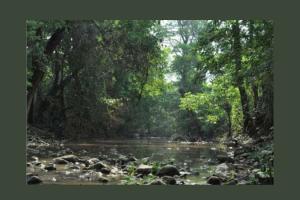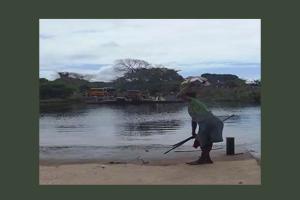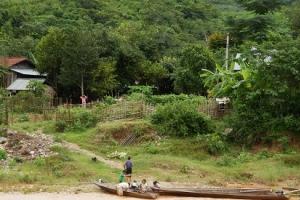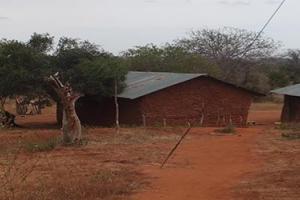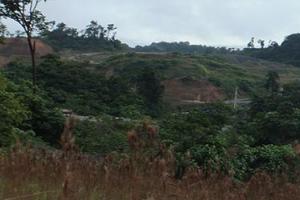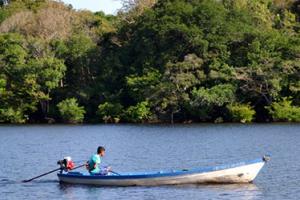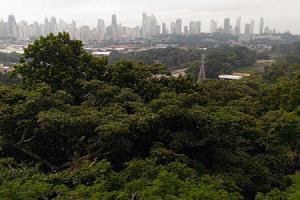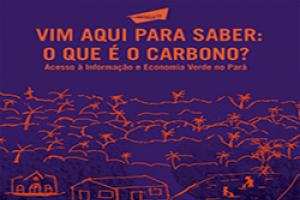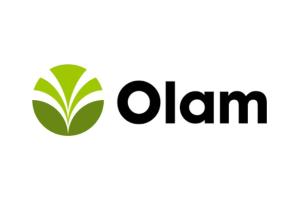Colombia is one of the first Latin American countries to set up and implement specific rules and regulations on biodiversity offsets. In addition to article 50 of law 99 from 1993, both resolution 1503 from 2010, and law 1450 from 2011 establish the need to standardize environmental offset mechanisms.
The Green Economy
The Green Economy is a tactic used to “clean up” the image of corporations rather than address corporate capture and capitalism as the true drivers of deforestation. False solutions promoted under the Green Economy include certification, sustainable forest management, ecosystem services, REDD+, the bioeconomy, nature-based climate solutions, and zero net deforestation. Rather than stopping it, these “solutions” support corporate-driven destruction that is causing a deep social and ecological crisis.
Bulletin articles
23 August 2017
"It is an absurdity, as well as an injustice that they take away our forest claiming that they want to protect it, while in reality it is only a way for them to continue to devastate, with their mines, another forest somewhere else."
Bulletin articles
23 August 2017
Bulletin articles
23 August 2017
How air quality offsets were set in place
Bulletin articles
23 August 2017
BHP Billiton is the world's largest mining and petroleum company running mines in 13 countries. Its main offices are in Melbourne, Australia, and in London, UK, where the company sells shares on the London Stock Exchange.
Bulletin articles
23 August 2017
Action alerts
4 August 2017
Press Release
More than 80 organizations and individuals from all over the world sent today the letter enclosed below to relevant authorities in Brazil, Germany and California / USA rejecting “any and all attempts to intimidate or censor people and organizations that critique and oppose the environmental and climate policies implemented by the Acre government.”
Action alerts
24 July 2017
July 21, 2017
Dear friends,
We need your support to the motion enclosed below in solidarity with leaders from communities and organizations from the State of Acre in Brazil who are being pressured and threatened due to their critics and oposition to the climate and environmental policies being implemented by the state government in Acre.
Other information
7 July 2017
For many people, REDD+ is about projects that save forests. In reality, however, REDD+ has never been about protecting forests and also no longer really is about projects but about programmes covering whole regions or provinces within a country. Though many REDD+ projects continue to exist, causing harm to indigenous peoples and forest communities by restricting their traditional forest use practises. (1)
Other information
7 July 2017
Artigo 19 launches its report "I came here to understand: What is carbon? Access to information and the green economy in Pará." The report analyzes and criticizes the absence of processes that facilitate transparent access to information, and social participation, in the existing projects in Pará related to the carbon market and the REDD+ mechanism (Reducing Emissions from Deforestation and Degradation). You can read the publication in Portuguese here: http://artigo19.org/blog/2017/03/24/11201/
Action alerts
14 June 2017
We, forest dwellers, rubber tappers, Apurinã, Huni Kui, Jaminawa, Manchineri and Shawadawa indigenous people, members of supportive organizations and the Jesuit Travelling Team, teachers from different universities, united in the city of Xapuri in the Brazilian state of Acre from 26 to 28 May 2017, at the meeting "The effects of environmental / climatic policies on traditional populations", declare:
- That, at this moment of resurgence, we are unifying the struggles of indigenous peoples and rubber tappers in the same cause. Our union is our main weapon against capital.
Bulletin articles
15 May 2017
How do major oil palm companies manage to get their palm oil sold as a “green”, “sustainable” and “climate-friendly” product when it is none of that? How does this green image help corporations to expand even further, as is happening now in Africa? This article looks into the case of OLAM International, which in February 2017 published its Draft Global Policy on Forests (1). OLAM's promising words are merely a smokescreen around what is still its main objective: increasing profits.
Have oil palm companies changed?
